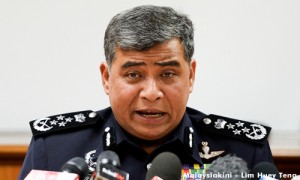 COMMENT Before delving into inspector-general of police Khalid Abu Bakar’s warning about a possible terrorist strike because of the hudud debate in Malaysia, let us look at a recent development in India.
COMMENT Before delving into inspector-general of police Khalid Abu Bakar’s warning about a possible terrorist strike because of the hudud debate in Malaysia, let us look at a recent development in India.
Stating that nothing short of quashing the section in its entirety would suffice, the judges found it to be “open-ended and unconstitutionally vague” as well as “arbitrarily, excessively and disproportionately” invading the right to free speech, right to dissent and right to know.
Reports on the landmark judgment cited examples of how the law had been (ab)used.
This included a university professor and his neighbour, both of whom were detained for forwarding a cartoon lampooning the chief minister of the state of West Bengal.
Last year, a man was arrested for saying on Facebook that Narendra Modi, who was then in running for prime minister, would start a holocaust if elected.
In 2012, two young women were arrested under the law over a Facebook post criticising the shutdown of Mumbai after the death of a local hardline politician.
One of them, said a report, was arrested simply for “liking” the post.
In Malaysia, a similar scene is unfolding, where the police are accused of arresting more people in the virtual world than in the real world.
A clear and present danger
On the day India’s judiciary delivered its judgment in favour of free speech, Khalid warned that discussions on hudud, the controversial Islamic penal code which Kelantan wants to impose, could incur the wrath of terrorist group Islamic State, whose supporters he feared might choose to retaliate.
He disclosed intelligence reports warning that an IS attack on Malaysian soil was imminent and urged all quarters not to make the situation worse.
Yes, the IS threat in Malaysia is real, a clear and present danger. The radical group’s slick propaganda campaign have even lured Malaysians to fight for IS in Syria while numerous sympathisers have been detained here.
According to Khalid, questioning hudud, which is considered Allah’s law and sacrosanct by Muslims, could lead certain quarters to react with violence.
Indeed, to some militant Muslims, irrespective of whether they have explosives strapped to their waist, the law of Allah is infallible and cannot to be scrutinised by man, let alone those of other faiths.
Critics have lambasted the police for tapping their feet to the tune of their political masters and quashing dissent in the social media and elsewhere. And the police seem to be lending credence to this with each arrest.
Activists here, like those in India, have strenuously argued that political discussion is an essential part of our democracy, a right which is protected by our constitution. This includes matters pertaining to faith. After all, all Malaysians will be affected, whether directly or indirectly.
Granted, such discussions should not degenerate to the point where faiths are disparaged. Particularly so in a nation where race and religion are sensitive issues. Civil debates are the hallmark of a nation’s maturity.
That said, it’s not the job of the police to tell us what we can or cannot discuss. Their job is to stop the IS menace and ensure the security of the nation so that every Malaysian can feel safe in the streets and at home.
The police should focus on that task instead of clamping down on freedom of expression.
























